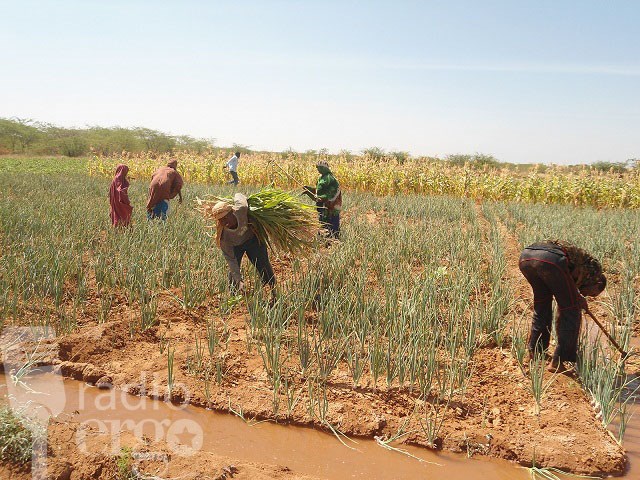
Monday September 19, 2022

(ERGO) – Farmers in Dollow district in southern Somalia’s Gedo region have been losing the fight against crop pests destroying their vegetables and other produce.
Mukhtar Abdullahi Mohamed, 49, owns a three-hectare farm in the village of Qansahley, Dollow district, where he planted tomatoes, maize, and onions in February and March. The crops became infested by insects, particularly thrips and aphids and their larvae.
Two thirds of his produce was devoured by pests. Instead of harvesting now as anticipated, he is saddled with a $3,000 debt that he took to invest in the farm.
“We bought seeds, petrol, and fertilisers. We also bought 40 kg of pesticides as well. We still have some hope of rescuing some of our onions and then we will really establish how much of a loss we have incurred,” he said.
Since January, Mukhtar and his family of nine have been relying on loans for their food and basic needs. On top of the investment loan they owe a further 20,000 birr ($222). He plans to sell some of his onions to clear off part of the debt.
“It has really affected my life. Before I would use my income to pay my investment loans, pay school fees, and still have some money to do things. Now my hope is only paying off the debts.”
In 2021, about 1,500 farms in Dollow district that depended on the river Juba for water suffered devastating attacks by pests. The steep rise in fuel prices has also been weighing heavily on the farmers, with a barrel rising from $95 to $300-310. Water shortage has also remained a huge challenge.
Abdi Hussein, 42, gave up farming on his one-and-a-half hectare plot in Abore village in Dollow because of the pest invasions and rocketing fuel prices.
This father of four said he took an investment loan of $2,500 to buy tomato and onion seeds and has not been able to repay any of it.
“I took steps to invest in my farm, and everything I worked on has been destroyed by the pests. Today I can’t take any more steps with this farm. I am concerned about just surviving now,” said Abdi.
According to Mohamed Dayib Abubakar, dean of the faculty of agriculture and livestock at Jazeera University, crops are vulnerable to insects if there are no proper control mechanisms.
Dayib, a founder of Somali Natural Resources Research Centre (SONRREC), said preventive pesticides should be used before the insects multiply and become more potent.
However, many Somali farmers need training to deal effectively with the pests and pesticides available.